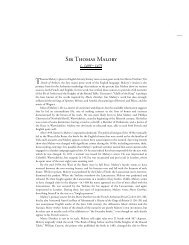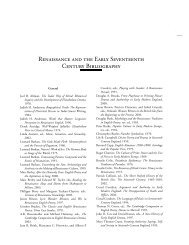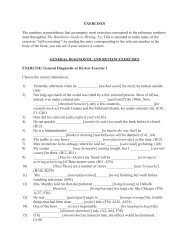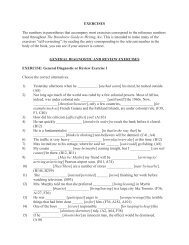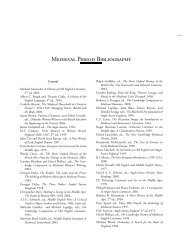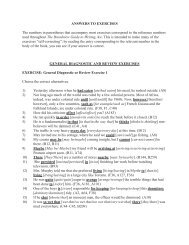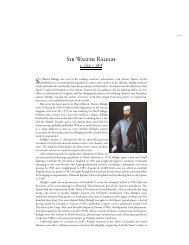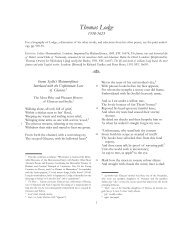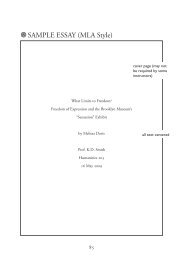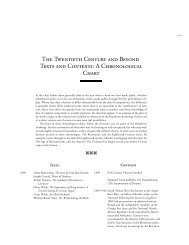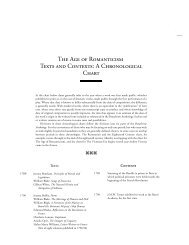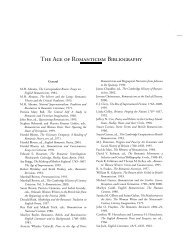Contexts: The Abolition of Slavery - Broadview Press Publisher's Blog
Contexts: The Abolition of Slavery - Broadview Press Publisher's Blog
Contexts: The Abolition of Slavery - Broadview Press Publisher's Blog
Create successful ePaper yourself
Turn your PDF publications into a flip-book with our unique Google optimized e-Paper software.
30<br />
35<br />
40<br />
45<br />
6 <strong>Contexts</strong><br />
For what they must meet with when they get there,<br />
Which nobody, &c.<br />
’Twould do your heart good to see ’em below<br />
Lie flat on their backs all the way as we go,<br />
Like sprats on a gridiron, 1 scores in a row,<br />
Which nobody, &c.<br />
But ah! if in vain I have studied an art<br />
So gainful to me, all boasting apart,<br />
I think it will break my compassionate heart,<br />
Which nobody, &c.<br />
For oh! how it enters my soul like an awl! 2<br />
This pity, which some people self-pity call,<br />
Is sure the most heart-piercing pity <strong>of</strong> all,<br />
Which nobody, &c.<br />
So this is my song, as I told you before;<br />
Come buy <strong>of</strong>f my stock, for I must no more<br />
Carry Caesars and Pompeys 3 to Sugar-cane shore,<br />
Which nobody can deny, deny,<br />
Which nobody can deny.<br />
from William Wilberforce, “Speech to the House <strong>of</strong><br />
Commons,” 13 May 1789<br />
William Wilberforce began his long struggle to have<br />
the British Parliament abolish the slave trade with<br />
the speech excerpted below. In April <strong>of</strong> 1791, a bill<br />
put forward by Wilberforce was voted down by 163<br />
votes to 88; not until 1807 were his efforts on this<br />
score successful. News <strong>of</strong> the passage <strong>of</strong> the <strong>Slavery</strong><br />
<strong>Abolition</strong> Act reached Wilberforce on his deathbed<br />
in 1833.<br />
Areport has been made by his Majesty’s Privy Council,<br />
which, I trust, every Gentleman has read, and<br />
which ascertains the Slave Trade to be just such in<br />
practice as we know, from theory, that it must be. What<br />
should we suppose must naturally be the consequence <strong>of</strong><br />
1<br />
sprats on a gridiron Small fish on a griddle or broiling-pan.<br />
2 awl Tool for piercing holes in leather.<br />
3 Caesars and Pompeys Names commonly given to African slaves.<br />
our carrying on a Slave Trade with Africa? With a<br />
country, vast in its extent, not utterly barbarous, but<br />
civilized in a very small degree? Does any one suppose a<br />
Slave Trade would help their civilization? That Africa<br />
would pr<strong>of</strong>it by such an intercourse? Is it not plain, that<br />
she must suffer from it? That civilization must be<br />
checked; that her barbarous manners must be made<br />
more barbarous; and that the happiness <strong>of</strong> her millions<br />
<strong>of</strong> inhabitants must be prejudiced by her intercourse<br />
with Britain? Does not every one see, that a Slave Trade,<br />
carried on around her coasts, must carry violence and<br />
desolation to her very centre? That, in a Continent, just<br />
emerging from barbarism, if a Trade in Men is established—if<br />
her men are all converted into goods, and<br />
become commodities that can be bartered, it follows,<br />
they must be subject to ravage just as goods are; and this<br />
too, at a period <strong>of</strong> civilization, when there is no protecting<br />
Legislature to defend this their only sort <strong>of</strong> property,<br />
in the same manner as the rights <strong>of</strong> property are maintained<br />
by the legislature <strong>of</strong> every civilized country.<br />
We see then, in the nature <strong>of</strong> things, how easily all<br />
the practices <strong>of</strong> Africa are to be accounted for. Her kings<br />
are never compelled to war, that we can hear <strong>of</strong>, by<br />
public principles,—by national glory—still less by the<br />
love <strong>of</strong> their people. In Europe it is the extension <strong>of</strong><br />
commerce, the maintenance <strong>of</strong> national honor, or some<br />
great public object, that is ever the motive to war with<br />
every monarch; but, in Africa, it is the personal avarice<br />
and sensuality <strong>of</strong> their kings: these two vices <strong>of</strong> avarice<br />
and sensuality, (the most powerful and predominant in<br />
natures thus corrupt) we tempt, we stimulate in all these<br />
African Princes, and we depend upon these vices for the<br />
very maintenance <strong>of</strong> the Slave Trade …<br />
Sir, the nature and all the circumstances <strong>of</strong> this trade<br />
are now laid open to us; we can no longer plead<br />
ignorance,—we cannot evade it,—it is now an object<br />
placed before us,—we cannot pass it; we may spurn it,<br />
we may kick it out <strong>of</strong> our way, but we cannot turn aside<br />
so as to avoid seeing it; for it is brought now so directly<br />
before our eyes, that this House must decide, and must<br />
justify to all the world, and to their own consciences, the<br />
rectitude <strong>of</strong> the grounds and principles <strong>of</strong> their decision.<br />
A Society [the Society for Effecting the <strong>Abolition</strong> <strong>of</strong><br />
the Slave Trade] has been established for the abolition<br />
<strong>of</strong> this trade, [in 1787] in which Dissenters, Quakers,



